One of the main ingredients in effective search engine optimization, is the right SEO keywords, which, up until now, has been one of the most mysterious strategies to try to figure out by small to midsize businesses on their own.
However, once you understand how to select the right keywords on your own, as well as integrate them into your content, which the Google keyword search tool can help you do, you will be well on your way to enjoying increased traffic to your site, as well as increased ad clicks for advertisers.
The Google Keyword Planner, also known as the Google research tool, is a free in-depth keyword research tool offered by Google for free that enables users to get new keywords for both new content and Google ads, and it can be used on its own or in combination with other free Google tools to help improve your SEO campaign.
Some of the main uses of the Google keyword research tool include:
Research Keywords
The Google keyword research tool suggests various keywords and phrases that can be difficult to pinpoint otherwise, and since it is offered by Google itself, which is the very search engine that many website owners are trying to win over, it is a highly popular tool for advertisers and non-advertisers alike.

Whenever someone performs a Google search, they key in certain keywords or phrases to locate the business or information they are seeking; hence, the more the keywords or phrases in your content match the words or phrases visitors key in to find you, the more it increases the chance that your page will be returned, and top the list, in search results pages for their inquiry.
This, in turn, increases the possibility of them clicking on your page, which helps generate more traffic for your site as well as quality leads.
However, determining the exact keywords or phrases your target audience will be
Utilizing to locate your page can be difficult to anticipate on your own. Not to mention, there are over thousands of different word variations or phrases that visitors may use to find you, which can not only be overwhelming to list, but also cause you to keyword stuff, which can negatively impact you with Google.
Therefore, it will require research to help pinpoint and narrow your keywords for a more effective SEO keyword campaign.
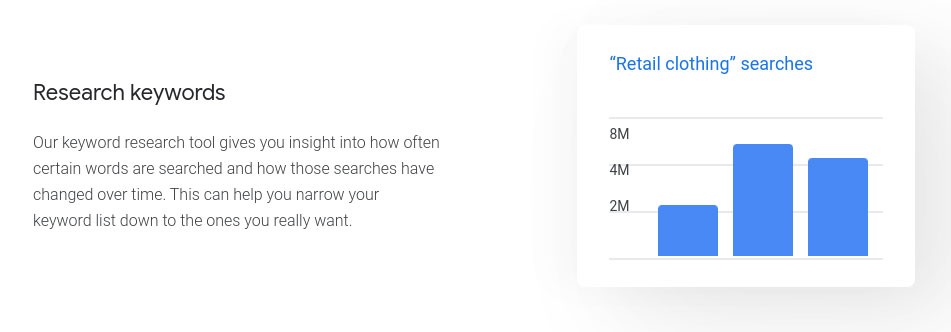
Using the Google keyword search tool, you can learn the frequency that certain keywords are searched, as well as how searches for those keywords have changed over time, which can help you select the SEO keywords you feel are most effective.
But, that’s not all it does. It also enables you to see historical metrics, such as search volume, for your keywords, which we will discuss next.
Test your SEO in 60 seconds!
Diib is one of the best SEO tools in the world. Diib uses the power of big data to help you quickly and easily increase your traffic and rankings. We’ll even let you know if you already deserve to rank higher for certain keywords.
- Easy-to-use automated SEO tool
- Keyword and backlink monitoring + ideas
- Speed, security, + Core Vitals tracking
- Intelligently suggests ideas to improve SEO
- Over 500,000k global members
- Built-in benchmarking and competitor analysis
Used by over 500k companies and organizations:
Syncs with 
Keyword Planner
The Google keyword planner, or keyword search tool, operates as two separate tools. Here is that planner:
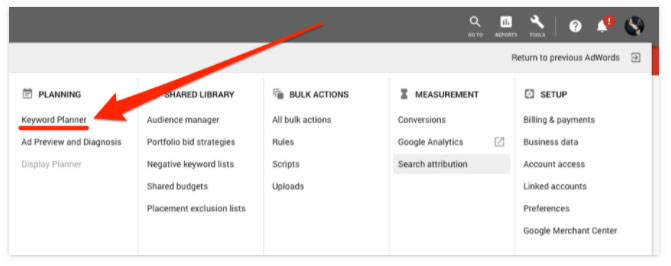
You Might Also Like
(Image credit: Ahrefs)
It can be used to help identify SEO keywords or phrases related to your business so that you can better reach your target audience, as we just saw, or it can be used to get historical metrics for existing keywords, which is beneficial to advertisers. That keyword screen looks like this:
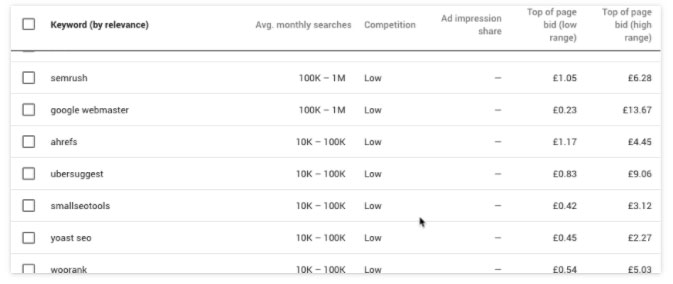
(Image credit: Ahrefs)
It also allows you to see an overview of how popular and competitive each keyword is, so you can forecast how they might perform in the future, as well as even provides you with a list of negative keywords, which is also useful for advertising.
Using this tool can help advertisers see how competitive a particular keyword is, which can assist them with budgeting and, in turn, also build a better campaign.
To get started, you simply paste a list of keywords into the tool, and select the “Get Started” option, which will take you to the Forecasts section.
Once in the Forecasts section, it will show you various details concerning your chosen keywords, such as the number of anticipated clicks to expect after 30-days of running the ads for your keywords on Google AdWords.
You can also click on the Historical Metrics tab to see 12-month search volumes for your keywords, like these:
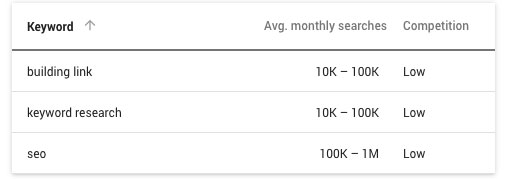
The Forecasts section also allows you to see a breakdown of estimated costs, CPC, and CTR to help you plan your campaign.
How Does the “Keyword Tool” Work?
To find new keywords that help you better reach people interested in your service or product, you simply click anywhere in the tool box, and then start with keywords or a website.
The tool will then prompt you to enter phrases, keywords, or URLs that relate to your business. You can enter up to 10 keyword phrases at a time, or there’s also an option to enter a website or URL and a keyword, up to 10 keywords, to help improve your keyword ideas.
Google will then return thousands of SEO keyword suggestions. The tool also includes competition, average monthly searches, low range top of range bid, and high range top of page bid for each suggestion.
For advertisers, once you have found the keywords you like, you simply paste them into the planner, after, which time you can then go to the Forecasts section to view the expected number of clicks for your chosen keywords in relation to Google Ad Words, as well as the estimated costs, CTR, and CPC.
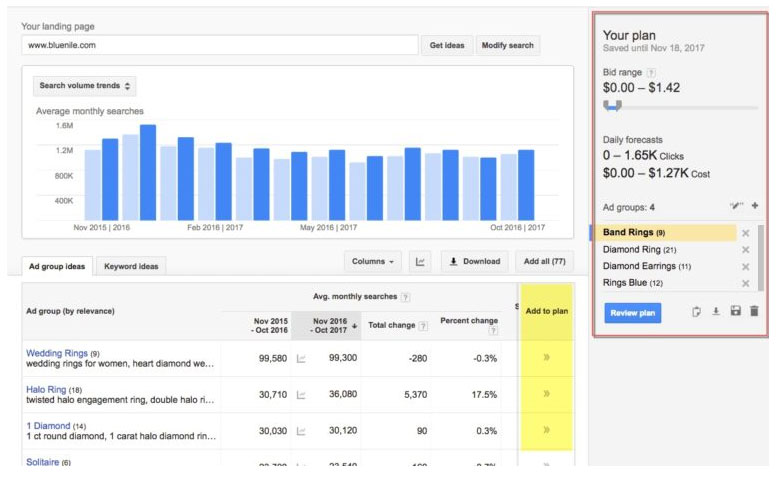
(Image credit: PPC Hero)
Keyword Tool for SEO and Content Creation
The Google keyword tool returns up to thousands of SEO keyword suggestions for your business, product, or service that can be used to improve your site’s SEO.
Once the tool has returned a list of SEO keywords that relate to your business, simply use the keywords or phrases to generate more personalized content for your target audience, which in turn helps increase traffic to your site, as well as your SEO ranking.
FACT: Content creation was deemed the most effective SEO tactic in 2019.
72% of marketers consider relevancy the most critical factor for improving SEO.
These keywords can also be used to help advertisers both bid on and build better ads that won’t break the bank.
Before creating your content using Google’s Planner tool suggestions, you may want to conduct a search for the keywords or phrases online.
This will enable you to better customize the keywords or phrases, so they are a bit different than other site’s keywords or phrases, which can also negatively impact your ranking in Google.
It will also enable you to look at the top-ranking results, which can also help you come up with other keyword ideas to generate your SEO content.
You can also use Google’s Language API tool to create better content and outperform in Google searches.
After conducting a keyword search using the Google key work search tool and coming up with potential keywords you can use, you can then run the keywords through the Google Language API tool to analyze the text for more information about your target audience, including their conversations, demographics, social media views, and more.
Keyword Tool for International SEO
If you have an international business, or if you are looking to expand your business internationally, the Google keyword tool can also be used to help you find SEO keywords for your international site.
When using the search tool, simply select your keywords by country and language to make sure you see search volume and competitiveness for the right market.
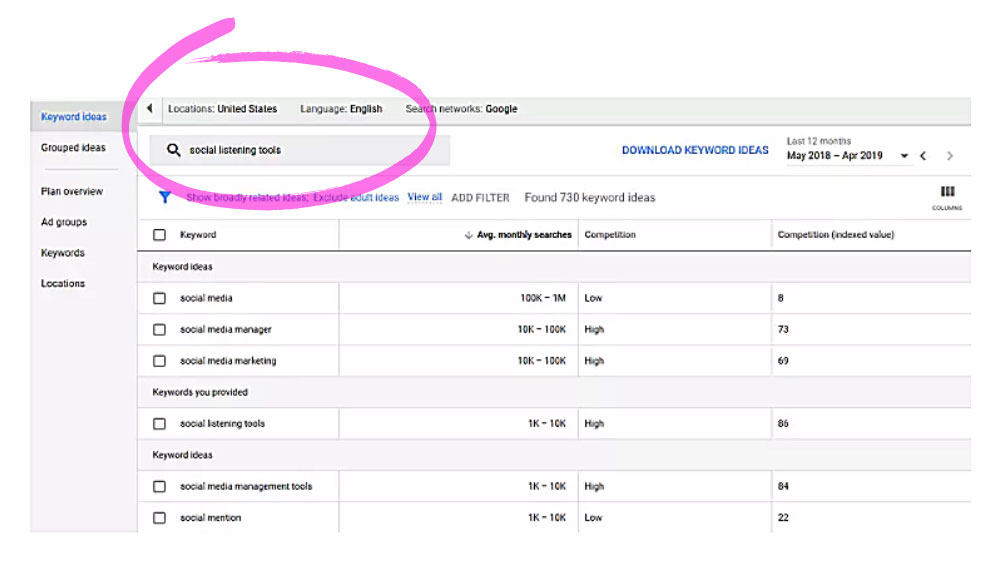
If you already have keywords in the relevant language, you can also use them to get other keywords in the right language. You can also enter your landing page to get a list of suggestions.
Once you have found the international keywords you want, then use them to create a message in the language of choice that will capture your audience’s attention.
You should also be sure to modify your site and on-page elements, such as the currency, addresses, phone numbers, and times so that they correspond to your international audience. This blog from Acclaro has fantastic ideas to localize your forms for international visitors:
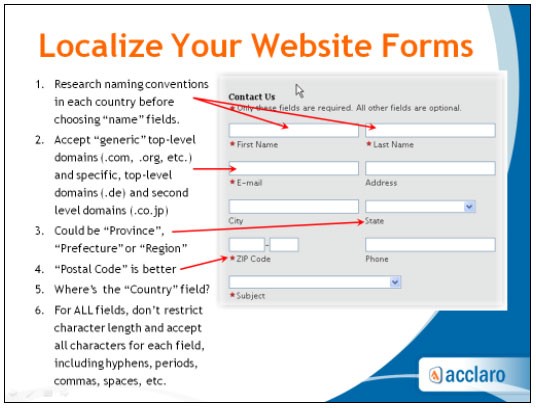
(Image credit: Acclaro)
You might also consider incorporating local link building into your page, which can be done with the help of local influencers or bloggers who can write in the language at a native level to help attract your target audience.
Meanwhile, the Google Analytics keyword tool can also be used to help you find or track your current international audience, as well as determine the audience’s language vs. the country for better targeting.
Keyword Tool for Advertising
As an advertiser, running online ads can be expensive without the right knowledge of your audience, as well as the best way to help control your costs when it comes to your
online ads.
Otherwise, running your ads can get expensive as you may have bid on keywords for your ads, but if no one clicks on your ads, then your investment was for nothing.
Or worse, your ads may receive many clicks, but without ever converting these clicks into actual sales, it can end up costing you more money because you still pay each time an ad is clicked, whether it results in a sell or not.
However, using the Google Keyword Planner helps eliminate the guesswork many advertisers face when it comes to bidding on keywords and running the best ads.
Once you have received the list of SEO keyword recommendations from the Google keyword search tool, simply run the list of words through the planner to analyze various metrics of the keyword, including their AdWords forecasts, estimated high range and low range costs, estimated performance over time, and more, which can help you build a stronger ad campaign.
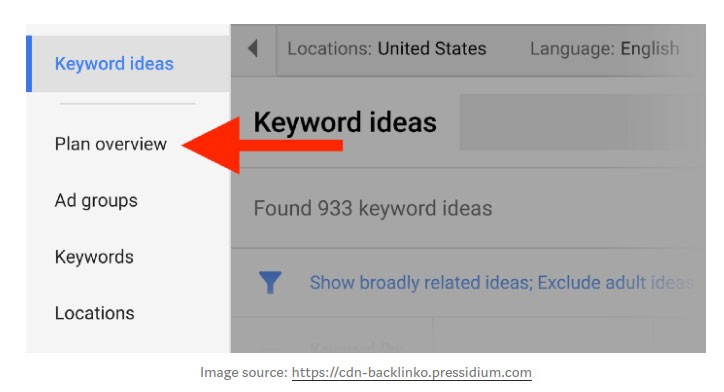
(Image credit: Backlinko)
The Google Analytics keyword tool can also be used in conjunction with Adwords to help help you conduct a google keyword traffic search, and more, which can help you learn even more details about your visitors, including where they are accessing your site from, the type of device they are using, which ads they clicked on, and more, which help better target your ads, so you don’t waste money.
It can also help you track google trends, which can also be used to help you adapt or change your ads as necessary to keep up with your current and expanding audience.
We hope that you found this article useful.
If you want to know more interesting about your site health, get personal recommendations and alerts, scan your website by Diib. It only takes 60 seconds.
Using the Keyword Tool
Google search tools are fairly easy to sign up and use, and many are also available for free.
Sign up for an Account
To use the Google Keyword Planner tool, if you are a new user, you will need to visit the Google Ads main page and then sign up for a new Google account to access the Google Planner.
Once you are done signing up, you will be asked about your main advertising goals, such as if you are looking to get more calls or website sales, etc.
Or, you can start using the tool without having to set up an actual campaign by
switching to expert mode, where you will then see an option to create an account without a campaign. This way, you can create a Google Ads account and start using Google Keyword Planner to find keywords without having to set up a campaign.
Access the Keyword Planner
To access the keyword planner, select “Keyword Planner” from the Tools and Settings drop-down menu.

(Image credit: compose.ly)
After you have selected an option from the keyword planner, select the results option, and it will return a list of keyword suggestions from the keywords or URL you entered. It will also list other keyword suggestions to help expand your search results.
Select Discover New Keywords or Volume and Forecasts
You will then be given the option to discover new keywords or get search volume and forecasts.
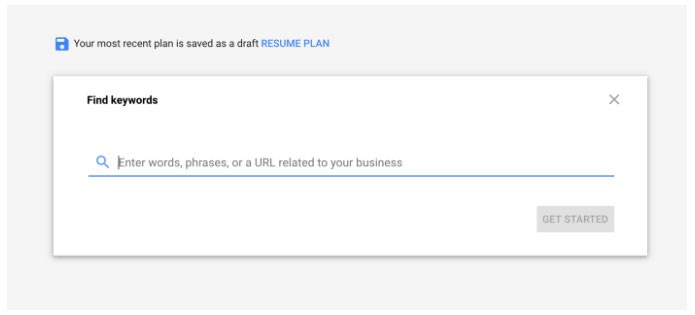
(Image credit: datadrivenu)
Select discover new keywords ideas to help increase traffic to your site. Or, select the search volume and forecasts option to get a future forecast about a keyword or to analyze the search volume and historical trends of the keyword.
The Google Keyword Planner will also show you four metrics with each keyword shown. These metrics include competition, monthly searches, low range top of page bid, and high range top of page bid.
The competition metric can be used as a basic metric to gauge the popularity of a keyword, or you can use it to analyze how challenging it will be to obtain an ad placement.
Meanwhile, the monthly searches metric shows how many times the keyword is used in searches each month. This way, you can determine which keyword can generate the most visitors to your site.
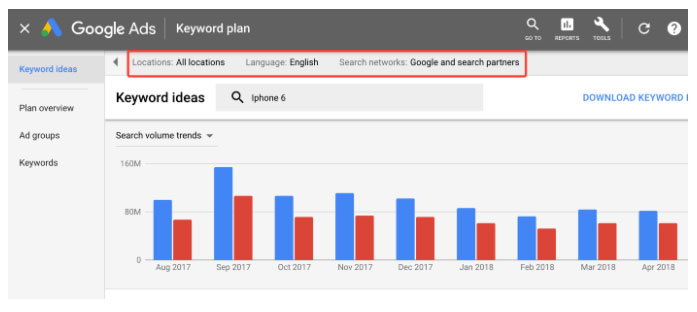
(Image credit: datadrivenu)
And then the top of page bid enables you to see how much advertisers are willing to pay for the keyword. The highest range option shows you the most advertisers will pay for a top of the page bid, and the lowest range option shows you the lowest advertisers will pay for a top of the page bid.
Use the Different Filters to Help Narrow Your Keyword Search
The keyword planner also enables you to use different filters to find new keywords based on time period, search network, and more.
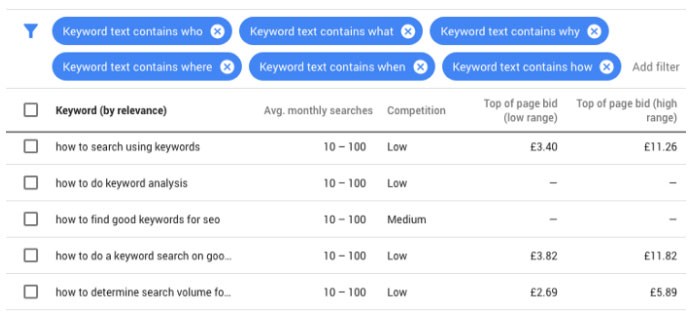
(Image credit: Ahrefs)
Use the volume and forecast option to view the number of times your ad will be displayed, cost-per-click, total number of clicks, and the average position your chosen keyword is anticipated to generate over a 30-day time frame.
To further understand the breakdown of the forecast report, use the Historical Metrics tab to view the average competition and monthly searches for the keyword.
Plan Your Campaign
You can then use this information to select keywords to help enhance your site’s SEO performance. In general, you want to look for keywords with a high search volume (between 1k and 10k) and low to medium competition for the quickest results.
Once you have selected keywords you are comfortable with, you can then begin incorporating them into your advertising or SEO plan for improved results.
These two Google search tools can also be used in combination with other Google key work search tools to help track Google trends, Google keyword traffic search, and more, which are also important for continued growth.
Diib®: Your Google Keyword Search Experts!
In the end, the Google Keyword Planner is probably most beneficial for advertisers to understand how valuable a keyword is, which helps with determining effective bidding values. However, it is also useful for website owners to find the most effective SEO keywords for increasing traffic and outperform the competition. Diib offers small to medium sized businesses, like yours, one platform to manage all your analytics, gauge your performance, and identify growth opportunities. Some of the features that can help you nail down your keyword campaign are:
- Use the keyword and backlink competitor research tools to find what keywords your competitors are ranking for and create content around those keywords.
- Use Diib® to understand key metrics, like bounce rate and returning visitors, for your specific content.
- See how your Facebook page followers like content you share.
Click here for a free 60 second site analysis or call 800-303-3510 to chat with a Growth Expert today!
FAQ’s
Google Keyword Planner is 100% free to use. You need not spend a penny on AdWords ads to gain access. You just need a Google account. You CAN access the tool WITHOUT running an AdWords ad.
First, use your main keyword in the first couple of sentences of your content, or at least within the first paragraph. Next, use that keyword and variations of it, throughout the content, as shown below.
Keywords, or good ones, can be isolated in different ways. A general term may have a higher search volume, making it harder to rank for, but will give your site a higher conversion rate.
The exact number will depend on your budget and your timeframe for results, however, primarily targeting about 5 keywords (each with a monthly search volume of 100+) to start with is recommended for most small businesses.
As odd as it sounds, it is possible to use too many keywords in your document. This can be viewed as “keyword stuffing” by Google. This can be penalized, or at the very least, cause your ranking to go down.
Most SEO growth experts will recommend a keyword density around 1-2%. This means that your target keyword would appear one to two times in 100 words. This will effectively show the search engine crawler what the page is about without being termed as “keyword stuffing”.
Speaking of tools, there are a few tools that specifically generate LSI (Latent Semantic Indexing) keyword ideas: LSIGraph and LSIKeywords.com. They both work pretty much the same way. You type in a keyword that you want to rank for and get a list of LSI terms that you can include in your content.




thangu says:
thank you very much.
writingprofitsystem says:
Greetings! Very helpful advice in this particular post!
It is the little changes that make the most important changes.
Thanks a lot for sharing!